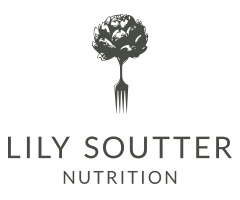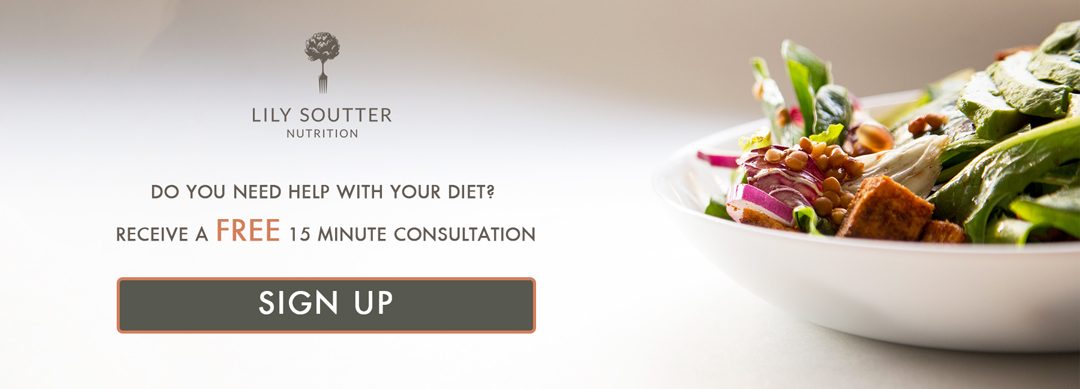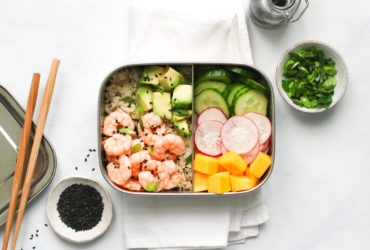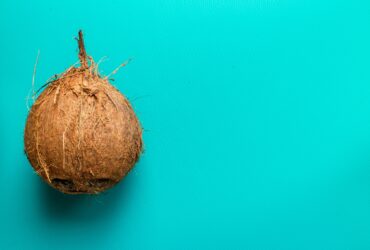This is why I’ve rounded up 12 delicious options to set you on the path to fruit and veg success…
1. Spinach
Dark green leafy vegetables such as spinach are a source of non-heme iron, which is needed to transport oxygen around the body as well as making red blood cells.
Spinach is also an excellent source of folate. This B vitamin is must for maternal tissue growth during pregnancy.
Top Tip – try blending into smoothies, use as the base for your favourite salad, or wilt with a little olive oil.
2. Brussel Sprouts
This festive winter veg is a rich source of vitamin C, as well as a special compound called sulforaphane. Sulforaphane is currently under research for potential anti-cancer properties.
Brussel sprouts are also extremely rich in fibre which is essential for supporting digestive health.
Top Tip – try roasting with walnuts and pomegranate seeds
3. Red bell pepper
Did you know that red pepper contains more vitamin C than an orange? Vitamin C contributes to the normal function of the immune system, as well as healthy gums, skin and teeth!
Top Tip – try making roasted stuffed red peppers, add to stir frys or even salads.
4. Sweet potato
Their vibrant orange colour comes from an antioxidant called beta-carotene. Beta-carotene is the precursor to vitamin A, an essential nutrient for immune support and the maintenance of normal vision.
Top Tip – combine sweet potato with healthy fats such as olive oil for optimal absorption of beta-carotene
5. Red cabbage
This colourful cruciferous veg is full of gut-friendly probiotics. Prebiotics are another word for special fibre which feed gut bacteria to help it flourish and grow.
Good gut bacteria is essential for keeping our digestive system healthy and happy.
Top Tip – boiling doesn’t have to be the only way to use red cabbage. Have a go at making red cabbage sauerkraut which comes with additional good bacteria.
6. Tomatoes
Their red colour comes from an antioxidant called lycopene. Emerging research suggests that lycopene may support heart health. As a general rule of thumb, the redder the tomato, the more lycopene it is likely to have.
Top Tip – interestingly, the lycopene content is much higher in processed tomatoes in comparison to fresh tomatoes, which include canned tomatoes, tomato juice, tomato-based sauces and even ketchup!
7. Avocado
Did you know that avocado is technically a fruit? This fruit is unique in the fact that it’s extremely low in sugar and comprises mostly of healthy monounsaturated fats.
Consumption of monounsaturated fats may help to maintain healthy blood cholesterol levels.
Top Tip – try smashing onto toast, use as a replacement for mayonnaise or even eat off the spoon! Don’t forget to scoop at the dark green lining just under the skin as this is the most antioxidant rich part.
9. Apples
Not only are apples among one of the most popular fruits, they are also full of pectin – a special type of prebiotic fibre which feed our good gut bacteria.
The rich fibre content in apples may also help to balance blood sugar and improve satiety.
Top Tip – try dipping apple slices into yummy nut butters for an indulgent yet healthy snack. Try baking apples, add a dollop of Greek yoghurt and a pinch of nutmeg and cinnamon for a super healthy dessert.
10. Cranberries
Unique in the fact that that their juices and extracts contain beneficial plant compounds which may help to prevent urinary tract infections.
Cranberries are also an excellent source of vitamin C, essential for maintaining the normal function of the immune system, and tiredness and fatigue.
Top Tip – toss frozen cranberries in with your favourite smoothie recipe, add to your morning porridge, add to mocktails, add to stuffing or cooked grains.
10. Bananas
Bananas are the perfect source of potassium, a mineral essential of the maintenance of normal blood pressure.
There is also an extremely high proportion of resistant starch in unripe bananas. Resistant starch is a special type of fibre which is fermented by gut bacteria, producing a side product called butyrate. Butyrate is short-chain fatty acid that appears to promote colon health.
Top Tip – bananas make the perfect base for smoothies. Try using as a sugar replacement in mouses, cakes, muffins or bread.
11. Satsumas
A festive fruit, which is a top source of vitamin C. Vitamin C does so much more than simply support the immune system during the winter months. It’s also essential for healthy skin, gums and teeth, it contributes to the reduction in tiredness and even may aid with absorption of iron from our food.
Top Tip – add satsumas to your salads, try making a relish, dip them in chocolate or enjoy as they are
12. Cherries
Full of antioxidants called anthocyanins which are responsible for their deep red or purple hue. Anthocyanins are currently under research for anti-inflammatory and potential heart health benefits.
Cherries are also a rich source of melatonin, a hormone which may improve quality of sleep. It’s important to note, however that studies in relation to sleep have used Montmorency tart cherries, and further research is needed.
Top Tip – add to you morning porridge, your favourite cakes, salads, smoothies, try making a cherry crumble or even enjoy some Montmorency tart cherry juice!
Lily is a London Nutritionist who graduated from Newcastle University with a BSc (Hons) degree in Food and Human Nutrition (AfN accredited) where she was awarded the Sage Faculty for Excellence Scholarship on an annual basis. She then went on to complete a 2-year post-graduate Diploma in Nutritional Therapy and is currently working towards her MSc in Nutritional Medicine (AfN accredited) at the University of Surrey. Lily’s extensive knowledge of the science of food and health, enables her to regularly write for The Times, The Telegraph, The Daily Mail, The Independent, Women’s Health and Cosmopolitan.
Her frequent TV appearances include ITV’s This Morning with Holly Willoughby and Phillip Schofield, and ITV’s primetime series Save Money: Lose Weight with Dr Ranj Singh. Lily’s passion is to simplify the science around nutrition, to provide health hacks and smarter eating strategies to empower people to enjoy a healthy and successful lifestyle. Her specialities lie in workplace wellness, implementing nutrition-focused wellbeing programmes within corporate organisations across the UK.
Lily also sees individual clients from her nutrition clinic in Chelsea, London and a private medical practice based in Notting Hill.




